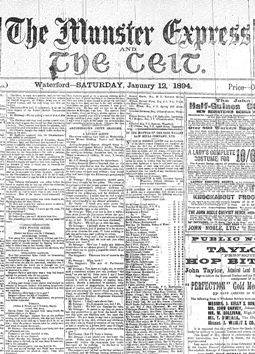LEARN MORE›››
Irish Newspaper Archives
From birth, death and marriage announcements and obituaries to sporting achievements or business advertisements and even court appearances, Irish Newspaper Archives can be a valuable source of genealogical and biographical information.
In the past, searching newspapers for an event was time very consuming. The digitisation of newspaper archives and their publication online has increased the value of newspapers as a genealogical research tool.
There are some limitations to this source. Early newspapers from the mid 18th century until the late 19th century only recorded announcements for certain classes.
The gentry, the professional class, the clergy, merchant families, wealthy farmers and some traders were recorded in the Irish press. From the late 18th century, as the penal laws were relaxed, the Catholic middle and merchant class began to have announcements published in newspapers and should not be excluded from your research on the basis of religion.
The large majority of the Irish population, small tenant farmers and the urban poor, are absent from newspapers, with the exception of those who were prosecuted for crimes. By the 20th century more and more of the general population appear in the Irish press.
The largest collection of Irish newspaper archives on the island, can be found at the National Library of Ireland. There is a newspaper database on their website, where you can identify newspapers that are relevant to your area, there was often more than one! The catalogue will also identify some collections that have been published online and provide a link.
 Newspapers published birth, marriage and death announcements as well as obituaries. Early birth, death and marriages announcements, can record the names of the parties, their addresses, occupations, parents names and even comments as to their character. 18th and early 19th century newspapers published paid personal announcements such as elopements, army desertions, business bankruptcies and changes to business proprietorships. Reporting on trials offers a great deal of information on ancestors who are convicts and this can be particularly useful for ancestors that have been transported.
Newspapers published birth, marriage and death announcements as well as obituaries. Early birth, death and marriages announcements, can record the names of the parties, their addresses, occupations, parents names and even comments as to their character. 18th and early 19th century newspapers published paid personal announcements such as elopements, army desertions, business bankruptcies and changes to business proprietorships. Reporting on trials offers a great deal of information on ancestors who are convicts and this can be particularly useful for ancestors that have been transported.
The first place to start with online newspaper research is the Irish Newspaper Archive . This is a subscription site, which contains a wealth of Irish newspapers, including the Freeman’s Journal, which dates from 1763 and local newspapers such as the Nenagh Guardian, which dates from 1838. Before subscribing to this site, check that their collection covers the period and newspapers that you are interested in.
The greatest obstacle to newspaper research is the sheer volume of text and it is important that you refine your search as much as possible, particularly if you are searching for someone with a common surname. Try to search using a more unusual surname or term, such as a townland address.
It is also important to note that Patrick Murphy, may have been recorded as P. Murphy or Mr. Patt Murphy, in the publication, so always try different variations of a name. An obituary may record the name as MURPHY, Patrick. This will not necessarily show up if your search term was “Patrick Murphy”.
The search page allows you to select a particular newspaper or all of the newspapers and a particular date range. Once you have the first round of results, you can then search the identified pages for additional terms, this will help to refine your search further. Not all of the newspapers digitised in this collection are complete and you should check the site for the available dates for the newspaper that you are interested in.
A number of Irish newspapers, representing the four Provinces of Ulster, Munster, Leinster and Connacht can be found at the British Newspaper Archive and the same collection is available at Findmypast.
The Irish Times has been digitised and is available online. This site allows you to search the current online newspaper as well as the archive. Make sure you choose to search the archive. The Irish Times dates from 1859 and has been entirely digitised. I find the search engine unwieldy, often failing to produce results for a search term that should have been in the text of the newspaper. If using this website, I would recommend patience and persistence. Keep trying different search terms and narrow your search by a date range.
Irish newspapers are not the only source for genealogical information. The movement of population between Ireland and England makes English newspapers worth checking.
The British Library’s newspaper collection is being digitised and published online (subscription). This is an excellent site with easy to use filters and their Irish collection is constantly expanding.
A newspaper obituary or death notice for an Irish emigrant in Canada, America or Australia may record their county of birth in Ireland.
Even if your ancestors were unlikely to have appeared in the press, don’t discount the possibility of an accidental finding such as an ancestor who was a sportsman, musician, actor or a political activist, a merchant who declared bankruptcy, a fire that destroyed a family home, criminal prosecutions or even a murder!
When your research becomes tedious, and you need a break, you can always search for 19th century jam recipes, political debates or even short stories. Irish Newspaper Archives are filled, not just with potentially relevant genealogical information, but also the news that formed the backdrop to your ancestors’ lives.

